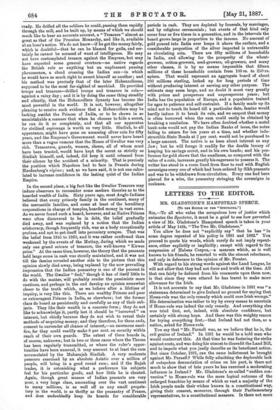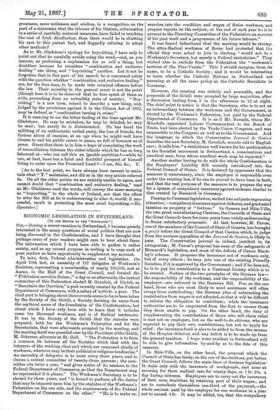LETTERS TO THE EDITOR.
MR. GLADSTONE'S HAMPSTEAD SPEECH.
[To ran EDITOR OW 7/111 SPZOTLTOZ."3 Sta,—To all who value the scrupulous love of justice which animates the Spectator, it must be a grief to see how perverted a view of Mr. Gladstone's Hampstead speech is taken in your article of May 14th, "The Two Mr. Gladstones."
You allow he does not "explicitly say" that he has "in some degree repented of his policy in 1::1 and 1882." You proceed to quote his words, which surely do not imply repent- ance, either explicitly or implicitly ; except with regard to the suspension of Habeas Corpus,—a measure which, as is well known to his friends, he resorted to with the utmost reluctance, and only in deference to the opinion of Mr. Forster.
With regard to his strong words against the Land League, he will not allow that they had not force and &nth at the time. All that can fairly be deduced from his comments upon them now, is that since they were uttered he has learnt to make more allowance for the Irish.
It is not accurate to say that Mr. Gladstone in 1881 was " a statesman determined to give Ireland no ground for saying that Home-rule was the only remedy which could cure Irish wrongs." His determination was rather to try by every means to ascertain if Home-rule was indeed the only remedy. And everything else was tried first, not, indeed, with absolute confidence, but certainly with strong hope. And there was this weighty reason for trying everything first,—that Ireland had not then, as a nation, asked for Home-rule.
You say that "Mr. Parnell was, as we believe that he is, the evil genius of Ireland." In 1881 he would be a bold man who would controvert this. At that time he was fostering the strike against rents, and was doing his utmost to discredit the Land Bill, and to impede what you justly describe as its beneficent action. But since October, 1881, can the same indictment he brought against Mr. Parnell? While fully admitting the deplorable lack of outspoken denunciation of crime on his part, is there not much to show that of late years he has exercised a moderating influence in Ireland? Mr. Gladstone's so-called " sudden con- version" to Home-rule was the mere logical outcome of the enlarged franchise by means of which so vast a majority of the Irish people made their wishes known in a constitutional way, giving their consent, moreover, through their Parliamentary representatives, to a constitutional measure. Is there not more
greatness, more nobleness and wisdom, in a recognition on the part of a statesman that the labours of his lifetime, culminating in a series of carefully matured measures, have failed in reaching the root of Irish disaffection, than there would be in shutting his eyes to this patent fact, and doggedly refusing to adopt other methods P As to Mr. Gladstone's apology for boycotting, I have only to point out that he carefully avoids using the word,—not, as you assume, as preferring a euphemism for so evil a thing, but doubtless because he considers "combination and exclusive dealing " one thing, and " boycotting" another. Let it not be forgotten that in this part of his speech he is concerned solely with the question whether " combination and exclusive dealing " are, for the first time, to be made into criminal offences before the law. Their morality in the general sense is not the point (though here it is to be observed that he does speak of them as evils, proceeding from an unhealthy state of society). "Boy- cotting " is a new term, coined to describe a new thing, and, judged by the provisions against it in the Crimes Act of 1882, may be defined as "combination issuing in crime."
It is amazing to see the bitter feeling of the time against Mr. Gladstone. He may be mistaken, he may be deluded, he may be mad ; but surely he is disinterested. He has faced the splitting of an enthusiastic united party, the loss of friends, the furious abuse of enemies, at an age when he might well have chosen to end his public career in peace, as fall of honours as of years. Grant that there is in him a hope of completing the work of reconciliation between the sister-islands which he has so long Aaboured at—who can call this an ignoble ambition P—while he -can, at best, have but a faint and doubtful prospect of himself living to enter upon the Promised Land P —I am, Sir, &c., Y.
[As to the last point, we have always been earnest to main- tain what "Y." maintains, and did so in the very article referred to. On all the other points we are entirely unable to agree, and cannot doubt that "combination and exclusive dealing," used as Mr. Gladstone need the words, will convey the same meaning as " boycotting " to the whole of Ireland, nor that the effort to alter the Bill as he is endeavouring to alter it, would, if suc- cessful, result in protecting the most cruel boycotting.—En. Spectator.]



















































 Previous page
Previous page